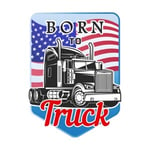 Keeping commercial truck drivers healthy and safe is a win for everyone. It minimizes the risk of driver injuries and fatalities, lowers the risk of damage to trucks and cargo, decreases driver turnover, reduces Truck Insurance and other costs, and creates safer roads for everyone.
Keeping commercial truck drivers healthy and safe is a win for everyone. It minimizes the risk of driver injuries and fatalities, lowers the risk of damage to trucks and cargo, decreases driver turnover, reduces Truck Insurance and other costs, and creates safer roads for everyone.
“In 2021, 5,700 large trucks were involved in a fatal crash, an 18% increase from 2020 and a 49% increase in the last 10 years,” according to the National Safety Council (NSC). “Also in 2021, 117,300 large trucks were involved in crashes resulting in an injury, a 12% increase from 2020. Since 2016, the number of trucks involved in injury crashes has increased 15%...”
Furthermore, according to the Federal Motor Carrier Safety Administration (FMCSA), “Drivers of large trucks and other vehicles involved in truck crashes are ten times more likely to be the cause of the crash than other factors, such as weather, road conditions, and vehicle performance.”
Healthier truck drivers are more alert and focused, minimizing the risk of accidents and creating healthier bottom lines for drivers and trucking companies.
7 Health and Safety Tips
- Get Lots of Rest
“Sleep deficiency can cause problems with learning, focusing, and reacting. You may have trouble making decisions, solving problems, remembering things, managing your emotions and behavior, and coping with change,” according to the National Heart, Lung, and Blood Institute. “You may take longer to finish tasks, have a slower reaction time, and make more mistakes.” Experts recommend that adults get between seven and nine hours of sleep a night. - Eat Healthy
Good nutrition is key to good mental and physical health. According to experts, a poor diet can cause fatigue, slower reaction time, impaired cognitive function, and more. - Stay Hydrated
“Mild dehydration can cause problems with blood pressure, heart rate, and body temperature,” according to Cedars-Sinai. “Severe dehydration can also cause weakness or confusion. In extreme cases, it can lead to kidney damage, brain damage, and even death.” Many experts recommend six to eight 8-ounce glasses of water a day. - Manage Stress
Driving a large truck, dealing with traffic and other drivers, sticking to tight deadlines, etc., can all lead to stress, and stress can cause headaches, fatigue, memory problems, sleep problems, and more. You may not be able to eliminate stress, but if you want to be a safer driver and minimize the risk of causing an accident, it’s crucial that you learn how to manage stress. - Wear Your Seatbelt
The FMCSA reports that safety belts, especially lap/shoulder belts, are effective in reducing injuries and fatalities and the cost of operating large trucks. Plus, it’s the law. Failure to wear a seatbelt can result in state or federal penalties to drivers and employers. - Avoid Distracted Driving
Distracted driving can cause accidents, resulting in death, injuries, property damage, higher operating costs, litigation, and more. Distractions can come from inside – texting, eating, adjusting the radio, etc. - or outside – billboards, unusual sights, etc. If anything takes your eyes off the road, it is a distraction. If anything takes your mind off driving, it’s a distraction. If anything forces you to take your hand or hands off the wheel, it’s a distraction. - Practice the Optimal Seating Position
Understanding the optimal seating position can help alleviate many health issues by decreasing strain on various body parts. Plus, it can increase driver comfort, increase safety in a vehicle accident, and optimize the visibility of the vehicle controls while driving.
Don't Overpay For Truck Insurance!
At American Insuring Group, we go beyond providing you with affordable truck insurance. We carefully analyze your needs and match you up with the best trucking insurance policy based on a careful pricing and coverage analysis of many competing insurance companies.
Call us today at (800) 947-1270 or (610) 775-3848, or connect with us online.



 If you’re a CMV (Commercial Motor Vehicle) driver, you’ve probably heard of a little federal agency called the Federal Motor Carrier Safety Administration (FMCSA).
If you’re a CMV (Commercial Motor Vehicle) driver, you’ve probably heard of a little federal agency called the Federal Motor Carrier Safety Administration (FMCSA). Give American Insuring Group a call at
Give American Insuring Group a call at 



